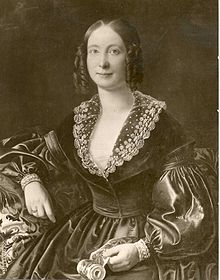Christoph Merian

Christoph Merian (born January 22, 1800 in Basel ; † August 22, 1858 ibid), son of Christoph Merian senior (1769–1849) and Valeria Hoffmann (1773–1834) was a large landowner, rentier and founder of the Christoph Merian Foundation .
Life
Christoph Merian-Burckhardt came from the noble Merian family in Basel . His father of the same name was a wholesale merchant and first ran raw cotton trading and later all kinds of shipping, banking and speculation businesses. He was considered the richest Swiss of his time. His company " Frères Merian " achieved particularly large profits by bypassing the Napoleonic continental barrier , which led to diplomatic interventions by France in Switzerland. The father gave up the risky trading business in 1810; henceforth he invested in Alsatian industrial companies or did banking.
After finishing school, Christoph Merian-Burckhardt completed a commercial apprenticeship, which enabled him to take up his father's profession one day. But he also showed a keen interest in agriculture and trained as an agronomist at the Agricultural Institute in Hofwil near Münchenbuchsee and at the Agricultural Academy of Hohenheim near Stuttgart from 1818 to 1821 . This was an unusual career path for a young Basel patrician son; However, by buying goods near Basel and in Lorraine, the father also showed an increasing tendency towards property. In addition, the above-mentioned training centers had an excellent reputation. Hofwil in particular attracted the sons of the European bourgeois and aristocratic elite.

In 1824 Christoph Merian married the industrialist daughter Margaretha Burckhardt (1806–1886). They lived in their city villa with Merian's parents. As a wedding present from Merian's father they received the 56-hectare estate Brüglingen , with the mansion Villa Merian , in Münchenstein near Basel, which Merian had a tenant manage from 1829. Although he did not have much equity at first, he soon began to acquire additional parcels; when his mother died in 1835, he was able to increase his purchases with the inherited money. All purchases served to expand and round off the Brüglinger Gut. At the end of his life, his property, including some other properties in the nearby state of Baden, comprised 325 hectares, which was unusually large by Swiss standards.
Merian's agronomic activity was not simply an expression of a romantic interest in the land or a departure from his father's financial affairs. Merian attached importance to modern land management and was an entrepreneurial investor who, however, placed the emphasis on solidity, in contrast to the speculative possibilities during the Napoleonic wars. He preferred safe securities and gave loans to artisans, farmers and traders.
Christoph Merian did not leave any personal records, which makes it difficult to interpret the motives for his actions. Certainly he had a traditional worldview that made the industrial revolution and its effects on society appear questionable to him. It was shaped by Pietism , which was particularly widespread in Basel ( Frommes Basel ). Out of a pronounced personal piety and a deeply rooted sense of class arose both a withdrawn, emphatically Christian way of life and a paternalistic sense of responsibility for the poor and needy. Merian donated considerable amounts throughout his life, e.g. B. for the city hospital, to make bread cheaper for residents of Basel and the surrounding area and for other things.
Christoph Merian died on August 22, 1858. The core of his will were Articles 26 and 27, with which he made the surviving wife and, after her death, the "dear hometown" a universal heir. When Margaretha Merian died in 1886, around twelve and a half million francs went to Basel. The Christoph Merian Foundation was used to manage the assets . The exclusive preference for Basel may have been due to a patriotic sentiment connected with the violent separation of the cantons in 1833. The articles, which are formulated in an open and very adaptable manner, stipulate that if the capital is preserved, the foundation's proceeds to «alleviate hardship and misfortune», «promote the well-being of the people» and «carry out the general or useful and expedient institutions incumbent on our urban community» to be used. The widow's subsequent work shows that the unusual legacy was based on the common will of the childless couple. Margaretha Merian-Burckhardt continued the commitments started by Christoph Merian. The church of St. Elisabethen , which he financed, was completed and handed over to the Basel-Stadt church commission. Due to its name (St. Elisabeth is the patron saint of the poor) and conservative design language (it is one of the most important neo-Gothic architectural monuments in Switzerland), the church is a stone creed of the Merian couple, which is buried in its own crypt under the building.
literature
- Traugott Geering : Christoph Merian. 1800-1858. Commemorative publication on the occasion of the 50th anniversary of the anniversary of his death. Basel 1908.
- Gustaf Adolf Wanner : Christoph Merian. Basel 1958.
- Paul Roth : Christoph Merian-Burckhardt. On the hundredth anniversary of his death. In: Basler Stadtbuch 1958, pp. 7-18.
- Rudolf Suter : The Christoph Merian Foundation. Basel 1986.
- Robert Labhardt : Capital and Morality. Christoph Merian - A biography. Basel 2011, ISBN 978-3-85616-525-3 .
Web links
- Hermann Wichers : Merian, Christoph. In: Historical Lexicon of Switzerland .
- Christoph Merian Personal Lexicon of the Canton of Basel-Landschaft
- Merian Gardens, Brüglingen
| personal data | |
|---|---|
| SURNAME | Merian, Christoph |
| BRIEF DESCRIPTION | Swiss landowners and founders of foundations |
| DATE OF BIRTH | January 22, 1800 |
| PLACE OF BIRTH | Basel |
| DATE OF DEATH | August 22, 1858 |
| Place of death | Basel |

